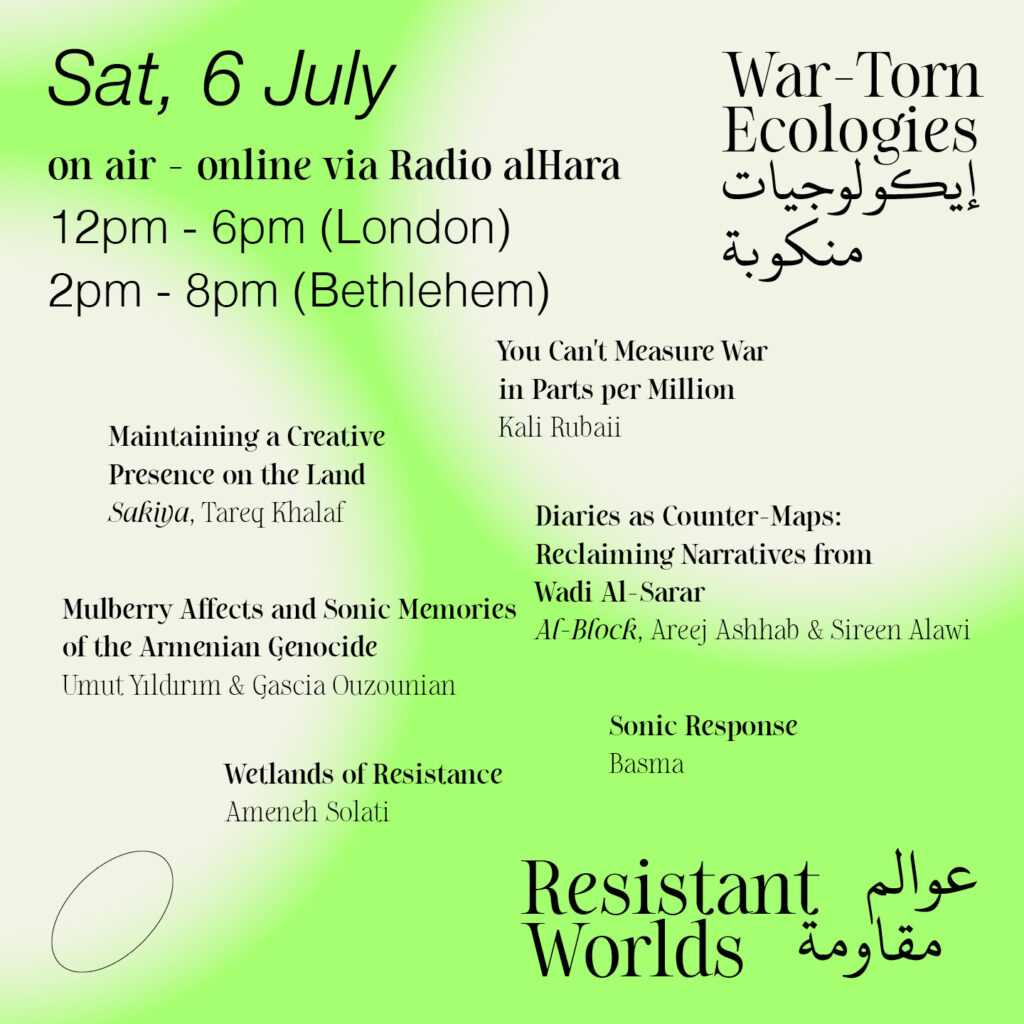War-Torn Ecologies: Resistant Worlds on Radio alHara

Tune in and listen back to the live programme as part of the London iteration of War-Torn Ecologies: Resistant Worlds, which took place last week (27-29 June) at The Mosaic Rooms.
Listen on Radio alHara via this link on Saturday 6 July, 12pm – 6pm (London) / 2pm – 8pm (Bethlehem).
The project is inspired by the book War-Torn ecologies, Anarchic Fragments: Reflections from the Middle East (2023) by Umut Yildirim. Extending from this, the programme focuses on the impact of perpetual colonial realities and counterinsurgency wars on ecologies in the Middle East. By engaging with artistic and ecological practices, it emphasises the relationship between human and more-than-human worlds as a methodology to counter ongoing colonial and imperialist systems of mass violence.
Talks and times
Welcome and Introduction
12:19-12:21 (London)
14:19-14.21 (Bethlehem)
Tareq Khalaf | Sakiya: Maintaining a Creative Presence on the Land
12:21-13:11 (London)
14:21-15.11 (Bethlehem)
Located in the agricultural village of Ein Qinya north-west of Ramallah, Sakiya is an experimental academy and cultural space, operating at the confluence of settler colonial expansion and the polluting effects of modern developments. By shifting cultural life to rural Palestine, Sakiya grafts agriculture with pedagogical, artistic and cultural activities, as a means to maintain a creative presence on the land. In the context of a militarised landscape and the alienating effects of a colonial spatial regime, Sakiya summons rituals of connection to land, memory and place through communal practices that insist on life.
Listening with Umut Yıldırım and Gascia Ouzounian | Mulberry Affects and Sonic Memories of the Armenian Genocide
13:11-14:18 (London)
15:11-16.18 (Bethlehem)
This conversation, which includes moments of collective listening, weaves together Umut Yıldırım and Gascia Ouzounian’s respective research on the genocidal erasure of Armenians. Yıldırım’s research posits mulberry trees on the banks of the Tigris River in the Armeno/Kurdish region of Turkey as ‘an-archic archives’ that raise questions about unrecognised massacre sites. Ouzounian draws from earwitness testimonies to explore sonic memory as a form of ‘counter-listening’. Both speakers employ these methodologies against the narrative of genocide denial that continues to be maintained by the Turkish state.
Ameneh Solati | Wetlands of Resistance
14:18-15:03 (London)
16:18-17.03 (Bethlehem)
The only uprising that occurred in Iraq during the thirty-five-year dictatorial rule of the Ba’ath party led by Saddam Hussein (1979–2003) started in the marshes in southern Iraq. It was the largest insurrection in the region until the Arab Spring in 2010. In this talk based on her essay ‘Wetlands of Resistance,’ Solati discusses the marshes as far more than mere zones of ecological and cultural richness or biological diversity, but also a political arena where power, autonomy, and resistance are articulated.
Kali Rubaii | You Can’t Measure War in Parts per Million
15:03-15:48 (London)
17:03-17.48 (Bethlehem)
Even as Rubaii’s environmental health research aims to measure weapons residue in the air, soil, and water of Iraq’s Anbar province, the landscape cannot be reduced to quantified evidence. A breath emitting Co2 and inhaling particulate matter, is also a scream, a last word. Food that is a vector for radiation is also kinship, endurance. Soil that is a sample is also a whiff of the homeland, a sacred relic. This series of ethnographic vignettes and creative nonfiction depicts the toxic, ghostly, fleshy, or nascent residents of Iraq’s war-injured ecologies and reflects upon the responsibilities to witness them.
Al-Block – Areej Ashhab & Sireen Alawi | Diaries as Counter-Maps: Reclaiming Narratives from Wadi Al-Sarar
15:48-16:30 (London)
17.48-18:30 (Bethlehem)
In this talk, Areej Ashhab and Sireen Alawi from Al-Block will present their recent work on Wadi Al-Sarar, a valley extending from Palestine’s Central Mountains westwards to the Mediterranean Sea. They trace its role as a route connecting Palestinian villages, communities, and their remains while traversing the separation wall and Israeli settlements, blurring the geopolitical boundaries that divide historical Palestine into separate jurisdictions. They will showcase an introductory video and read excerpts from their “Walker’s Logs” book series, sharing insights into their methodologies and highlighting walking as a tool for counter-mapping the contemporary Palestinian landscape.
Basma | Sonic Response
16:30-18:18 (London)
18:48-20:18 (Bethlehem)
War-Torn Ecologies: Resistant Worlds is curated by Odessa Warren, Umut Yildirim, Reem Shadid (Beirut Art Center), Siegrun Salmanian and Angelina Radaković (The Mosaic Rooms). The programme will resume at Beirut Art Centre in September 2024.
The programme War-Torn Ecologies: Resistant Worlds is supported by Art Jameel and British Council through Anhar: Culture and Climate Platform.
Design by Rand Hamdallah.